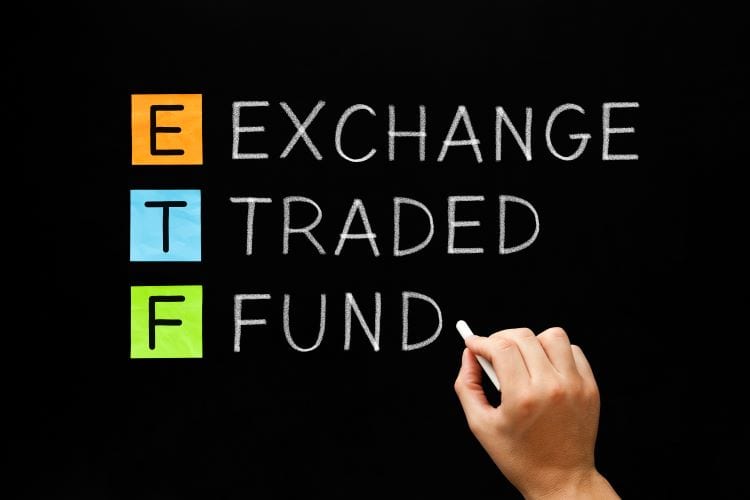What Is an ETF?

If you’re eager to dip your toes in investing waters, consider exchange-traded funds (ETFs). What is an ETF? These investments have surged in popularity in the past 15 years. Only about 200 ETFs were available to U.S investors in 2005, but today there are nearly 1,800 of them holding a total of $3 trillion in assets!
By combining mutual funds’ and stocks’ most favorable characteristics, ETFs are particularly well-suited to novices and individual investors. They open the door to a rewarding investment opportunity at any stage of your life.
Read about micro-investing and how to get started with our complete guide: Micro-Investing: What It Is, Why It’s for You and How to Start.
Exchange-Traded Funds Defined
Picture exchange-traded funds as a big basket of different individual investments or assets (like a mutual fund). These assets can be about anything: stocks, bonds, commodities, and other securities.
Most ETFs specialize in one type of asset, like stocks. It’s possible to have an ETF that’s a mix of stocks and bonds or other assets. An ETF provider owns the entire ETF basket and sells shares of the basket to investors like yourself. This means that if you purchase an ETF, you’ll own a portion of the fund but not the underlying assets in the fund, and the shares of the ETF itself trade on an exchange like the NYSE.
In this way, buying an ETF is similar to buying shares of a company on the stock market. ETFs can also be bought, sold, and traded throughout the day on an exchange, just like stocks, and their share prices fluctuate. The most significant difference is the type of underlying assets.
The Pros of ETFs
The biggest advantage of an ETF is the ability to buy a bunch of stocks at once instead of individually. The biggest and most successful ETFs are created around indexes like the S&P500, which tracks the biggest 500 companies in the U.S. If you “pick” the entire S&P500 with an ETF, you’re more likely to get a higher return with less risk than picking individual stocks.
Exchange-traded funds tend to charge lower fees than mutual funds, which is one of their biggest draws for investors. The average U.S. equity mutual fund charges 1.42% in annual fees, while ETFs only charge an average annual fee of 0.53%. Compared to mutual funds, ETFs also offer the benefit of a lower cost of entry. Many mutual funds require at least $1,000 for purchase, but most ETFs trade for less than that.
More than anything else, the simplicity of ETFs is appealing to investors. This explains why ETFs accounted for 30% of the value of all U.S. trading in 2016. They’re easy, relatively cheap, and offer immediate access to diversified products. It would take much more time and money to buy the individual components of an ETF basket than to just purchase an ETF itself.
Finally, ETFs are highly transparent and tax-efficient. You can search for the price activity of any ETF on an exchange instead of waiting for the monthly or quarterly reports required with mutual funds. You also only pay tax (capital gains) if you sell your ETF or when the ETF pays you a dividend. Because mutual funds (mainly actively traded ones) are consistently selling and buying stocks, you pay taxes on gains and interest as long as you hold them.
Cons of ETFs
You’re thinking that ETFs sound perfect for your investment needs, and you might be right! Just be sure to consider ETFs’ potential downsides before you start investing money into them.
ETFs do cost more than owning a stock outright. The fees associated with ETFs are called their “expense ratio.” While they are usually lower than the management fees of mutual funds, they can still be significant depending on the issuer. Complexity, demand, and economic environment all influence the ultimate cost per share of the ETF you want to purchase.
Additionally, mutual funds offer more choice and variety than ETFs do right now. TD Ameritrade alone has more than 4,000 transaction-fee-free mutual funds available but only 300 commission-free ETFs.
Ah, those commissions. Remember that ETFs incur such charges from your broker, especially if you’re using an online broker, just as stock trades do. (In contrast, many mutual fund companies don’t charge anything if you buy funds through them.)
Also, Some ETFs can be at risk of closing unexpectedly if they don’t make enough to cover administrative costs. If this happens, you’re forced to sell sooner than intended, likely at a loss and with tax consequences.
The Final Word on ETFs
Overall, ETFs offer valuable investment opportunities for diversification and growth, but you’ll want to do your homework beforehand. Work with a trusted broker or financial advisor to ensure this form of investment best meets your goals.










